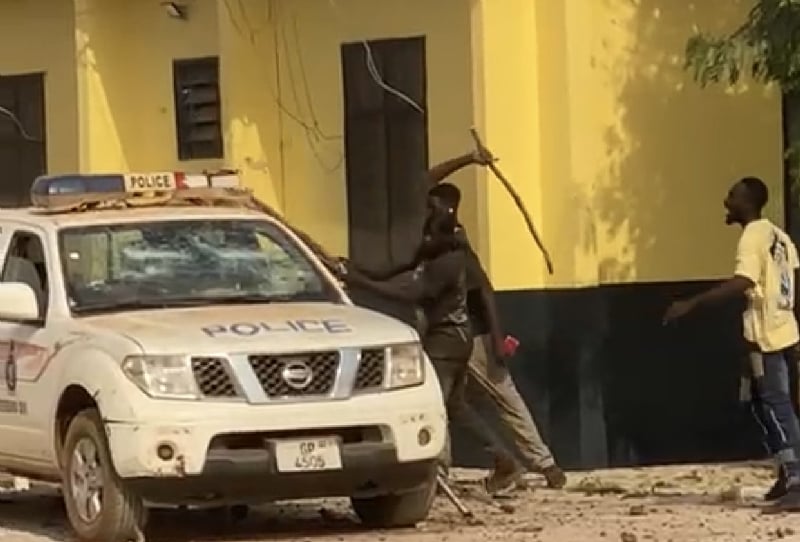The normally tranquil Atebubu Amantin Municipality in Ghana’s Bono East Region was recently convulsed by a wave of protests sparked by the escalating threat of armed robbery on the Atebubu-Amantin road. The catalyst for the unrest was the brutal murder of a 75-year-old driver on the night of January 10th, a tragic event that underscored the pervasive fear and insecurity gripping the community. Drivers, feeling abandoned by law enforcement and increasingly vulnerable to violent attacks, took to the streets to express their outrage and demand immediate action from the authorities. Their cries for help painted a grim picture of a community under siege, where even routine journeys to their farms were fraught with danger.
The drivers’ protests quickly escalated into a confrontation with the police. Already frustrated by what they perceived as the police’s inaction and prioritization of revenue collection over their safety, the demonstrators stormed the local police station, their anger palpable. The situation deteriorated further when a police vehicle was damaged, highlighting the deep-seated mistrust between the community and law enforcement. The drivers accused the Motor Traffic and Transport Department (MTTD) of focusing on issuing fines rather than addressing the pressing issue of armed robbery, which had claimed the lives of six drivers in recent months. This perceived negligence further fueled their resentment and strengthened their resolve to demand accountability.
George Mensah, the secretary of the Atebubu Amantin Ghana Private Road Transport Union (GPRTU), echoed the drivers’ concerns, emphasizing the boldness of the robbers who were now operating even in broad daylight. This escalation in the brazenness of the attacks served as a stark reminder of the growing lawlessness and the urgent need for effective intervention. The drivers’ collective decision to strike, a drastic measure born out of desperation, brought transportation in the region to a standstill, leaving countless passengers stranded and highlighting the significant economic and social impact of the insecurity.
The strike, a powerful expression of the drivers’ fear and frustration, underscored the failure of the authorities to address the escalating crime wave. The drivers’ refusal to return to work until their safety was guaranteed brought the issue to the forefront, demanding the attention of regional and national authorities. This act of defiance, while disruptive, was a necessary step to force a conversation about the urgent need for improved security measures and a more proactive approach to crime prevention. The drivers’ decision to withhold their services, while impacting the local economy, was ultimately a plea for protection and a call for action to address the root causes of the insecurity.
The intervention of military personnel eventually restored order and defused the immediate crisis. However, the underlying tensions remained palpable, a clear indication that the drivers’ concerns had not been fully addressed. The temporary calm achieved by the military presence did not solve the systemic issues that fueled the unrest. The drivers’ insistence on security guarantees before resuming work underscored their deep-seated fear and their determination to hold the authorities accountable for their safety. The arrival of the military, while restoring order, was a temporary solution to a deeper, more complex problem.
The events in Atebubu Amantin Municipality exposed a critical breakdown in security and a growing disconnect between the community and law enforcement. The drivers’ protests, sparked by a tragic death and fueled by long-standing grievances, served as a wake-up call for the authorities. The incident highlighted the need for a comprehensive approach to tackling the issue of armed robbery, including improved police presence, more effective crime prevention strategies, and greater engagement with the community to build trust and address the underlying causes of insecurity. The drivers’ courageous stand, though disruptive, brought much-needed attention to a critical issue that demands immediate and sustained action. Their demands for safety and security resonate not only within their community but also across the nation, serving as a reminder of the fundamental right to live and work without fear.


